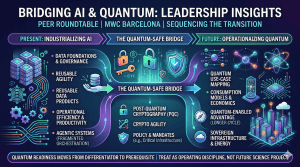Data compliance is the topic we’re tackling in this newest AnalystANGLE, which I believe is truly the next frontier—especially as it relates to all things AI. For this conversation, I’m joined by Sovan Bin, the CEO of Odaseva, to discuss data trends, compliance, data privacy, security, and other key challenges organizations face today.
Who is Odaseva?
For starters, let me share some backstories on Odaseva, a French-born, now global, enterprise data security platform that operates globally and supports over 100 million Salesforce users. The company was founded 12 years ago by Sovan, a self-described technical CEO with a background in technology who held prior roles at both Capgemini and Salesforce. The company initially focused on solving the problem of secure processing and securing (e.g. backup/archive/compliance) extensive enterprise data in Salesforce environments with complete confidentiality. In other words, working alongside Salesforce customers as a supporting data protection vendor, but never being able to view the customer’s data in the clear.
Odaseva recently secured a $54 million Series C round to expand globally and accelerate innovation in security, with a core focus on data. The company has now raised $90 million to date and claims to have amassed an impressive 100 million users. While the company has to date focused on providing secure processing and securing enterprise data for the Salesforce Ecosystem, the company’s forward-looking plans go well beyond Salesforce, and I see this as presenting some interesting opportunities ahead.
Watch Data Compliance Is The Next Frontier: Meet Odaseva here
Analyst ANGLE interview: Sovan Bin, Odaseva
Mine, yours, theirs? Who is responsible for the SaaS data?
During the course of my conversation with Sovan, we discussed the fundamental impact of understanding responsibility for data in a modern cloud and SaaS infrastructure. In 2015, Microsoft introduced the shared responsibility model in cloud computing. This model outlines the division of responsibilities between the cloud service provider and the customer, which is essentially a shared responsibility model. For example, when using a cloud email application such as Gmail, Google is responsible for ensuring the security, integrity, and smooth operation of the data center. However, if a user accidentally deletes important data or fails to protect against security threats like ransomware, the user is accountable for the data loss.
In this shared responsibility model, the customer is responsible for implementing their own backup and data archiving strategy to complement the primary SaaS application. The customer is also accountable for data confidentiality, integrity, availability, and compliance. Additionally, customers must ensure that they do not store unauthorized or sensitive information within the system.
From a security standpoint, customers must also navigate various compliance regulations, especially regarding privacy, industry, and security standards. Organizations must prioritize their backup and archiving responsibilities and align with compliance requirements to safeguard their data. This is the market in which Odaseva is operating today, but I see the potential as much broader.
Compliance is changing the data management game and AI
In recent years, there has been a significant shift in privacy regulations, particularly with the introduction of the General Data Protection Regulation (GDPR) in 2018. This marked a departure from traditional legal-based regulations to more technically oriented requirements, emphasizing data architecture and individual rights such as the right to be forgotten and data portability.
The impact of GDPR resonated globally, leading to the proliferation of similar privacy regulations worldwide. Notably, regulations in China have redefined the concept of data residency, emphasizing the importance of data processing location rather than storage location. Addressing these regulatory challenges and ensuring compliance within SaaS applications requires a proactive and strategic data management and security approach.
Addressing security issues when applying AI models without compromising sensitive data is equally important. Encryption and tokenization can safeguard data for AI processing. Pre-processing can remove specific information before feeding it into AI models, and post-processing is essential for data retrieval.
Wrapping Up
Odaseva is now broadly addressing compliance, privacy, encryption, and zero trust. This shift in focus is smart as it addresses a major concern in the technology industry — AI. That’s because as we’ve covered here before, where there is data, there is opportunity; however, in order to make the most of those opportunities, one must understand the role of data compliance. And there is no AI without data compliance. At a time where every enterprise is pursuing AI initiatives, I believe that it’s crucial to place more emphasis on data compliance to support AI models.
This is essential for several reasons:
Regulations. Regulations around the use of personal data play an outsized role here. Strict regulations such as GDPR and CCPA govern the collection and usage of personal data. It’s the law! Ethical considerations also require responsible and consensual data handling.
Trust. Building user trust is imperative. Compliant data handling is essential for building user trust and ensuring transparency in AI model operations.
Addressing/Mitigating Bias. Adhering to compliance standards ensures accurate and representative data, significantly improving AI model performance and mitigating biases. Rigorous compliance measures effectively address data biases, resulting in fairer AI outcomes.
Fiscal Responsibility. Today risk mitigation is a primary concern, and it’s imperative to have data compliance safeguards in place against data breaches and potential financial losses, de-risking the organization.
With the foregoing in mind, I see Odaseva as well-positioned to expand its market reach with its recent funding round and its strategy centered around data security and compliance. Beyond that, and beyond working only within the Salesforce ecosystem, I see much opportunity ahead for Sovan Bin and his team at Odaseva.
See more of my coverage here:


